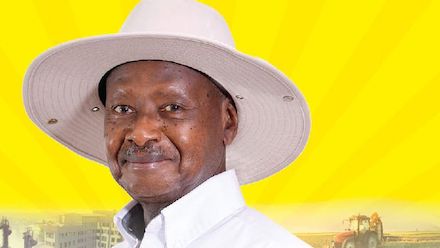Yoweri Museveni. Photo: Facebook.
Addressing the nation from his rural home in Rwakitura last Saturday evening, President-elect Yoweri Museveni, who was announced by the Election Commission he himself appointed as “President Elect,” delivered a one hour-long “victory” speech.
Although triumphant, he seemed furious. Almost as if he knew what many of us suspect with regard to the true results of the Jan. 14, 2021 elections. “If anyone tries to disrupt our peace, we shall deal with them decisively,” the 76-year-old growled in his angry address to the nation broadcast live on television. For a man who just supposedly won 58.64% of the votes as against opposition candidate Robert Kyagulanyi’s 34.83%, we expected magnanimity.
Instead, we got recrimination as the president took a swipe at the “elite” for letting the country down. Many elites felt that Museveni’s condemnation of them was misplaced in light of the fact that he himself previously bragged that he had secured their future with the educational policies which elevated them to becoming elites in the first place.
Again, the elites he speaks of are largely made up of his “supporters”. Museveni himself is no peasant, he is part of the elite he so wantonly condemns. However his condemnation of the elite to which he belongs is more than self-condemnation, but is also self-incrimination for what has gone wrong in our country.
In this sense, we also blame the elites—Museveni and his well-heeled apologists. However, to go beyond the surface, the Museveni is out of touch with the way of the world. What he is inadvertently calling to our attention is a breach between modern and traditional societies, collectivism and individualism.
The elites tend be modern and individualistic, unburdened by the collective problems of a government which has failed to curate a collective response to those problems. In the past, society was constructed upon the masonry of communalism. This is why African socialism was a powerful battle cry amongst elites at independence.
Today, such collectivized will and thought are a distant memory. This situation invokes William Whyte’s 1956 book, “The Organization Man.” This book highlights the divergence between two ethics constantly at battle in American society.
Whyte wrote about Protestant Ethic, the idea that the “pursuit of individual salvation through hard work, thrift, and competitive struggle is the heart of American achievement,” and a Social Ethic: “of himself, [man] is isolated, meaningless; only as he collaborates with others does he become worthwhile, for by sublimating himself in the group, he helps produce a whole that is greater than the sum of its parts.”
He concluded that the Protestant Ethic was losing ground to the Social Ethic. In Uganda, the reverse is true. The elite are pursuing individual salvation. They have good jobs, property and are cushioned by comfortable values which extoll the virtues of individuality, continuity and stability. Their benefits are not because of NRM policies, but in spite of them. That’s why they abandoned Museveni at the polls.
Museveni is now asking the elites to turn their backs on personal gains to join with the rural dispossessed in order to make insecure the future he promised to secure. And thereby achieve something lesser than what they need to achieve in order to be independent of his misrule.
Yet, in a capitalist economy, the dominant ethic is individualism. This protects individual rights to preserve standards of living and earnings. On the other hand, Museveni’s “let’s all go down together” approach, like any collectivist ideology, relegates individual rights below the privileges of the collective. Here we see his secret plan to impose dictatorship upon the elite while claiming it is patriotism.
The elites disagree, and so refuse to surrender more and more of their freedoms to a politically bankrupt government. This way, they can make livelihoods independently of a government which hopes to impoverish them in order to control them.
Being self-sufficient and knowing how to manipulate the system in their favor, our elite don’t care about putative social programs initiated by the NRM. Unless they come in the shape of concrete benefits for us as a whole. So they shall remain soundproof to government’s blandishments once their individualist benefits remain untouched and they can realize sectional goals without the government.
This speaks to the 20th century Oxford philosopher Isaiah Berlin’s 1953 essay titled, “The Hedgehog and the Fox.” It focused on the view of history that places people into two distinct categories. Hedgehogs, who view the world through a single central vision, and foxes, who chase scattered ideas pursuing many ends. Essentially, hedgehogs are simplifiers and foxes are multipliers.
Museveni and his less-than-merry band of misleaders are hedgehogs who present a grandiose vision on how to “correct” Uganda. It is sweeping and simple: vote the dictatorship and everything shall miraculously be added unto you. The elite in Uganda are foxes. They look at the details with a view to gathering the pieces to solve a jigsaw puzzle.
They are distrustful of grand visions for change. Since they heard about “fundamental change” promised when Museveni seized power in 1986, and see how it has turned out to be mere smoke and mirrors. Or a con initiated by a dishonest and unpatriotic government.
So they seek to place their stock in the benefits flowing from the sweat of their brow and not NRM’s empty slogans. Interestingly, Berlin concluded that the 20th century and beyond would belong to the foxes.
While Museveni, according to the Law of Attraction, becomes what he condemns. To ensure, fittingly, that he is identified as the problem he claims the elite are. Columnist Philip Matogo can be reached via mugashop74@gmail.com







